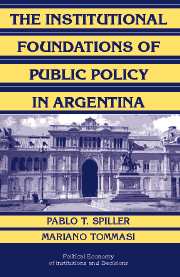Book contents
- Frontmatter
- Contents
- Acknowledgments
- Introduction
- I An Intertemporal Approach to Policy Making
- II The Workings of Political Institutions, Policy Making, and Policies in Argentina
- 3 Congress, Political Careers, and the Provincial Connection
- 4 Federalism, Argentine Style
- 5 The Supreme Court
- 6 The Bureaucracy
- 7 The Nature of Public Policies in Argentina
- Concluding Remarks
- References
- Index
- POLITICAL ECONOMY OF INSTITUTIONS AND DECISIONS
5 - The Supreme Court
Published online by Cambridge University Press: 17 March 2011
- Frontmatter
- Contents
- Acknowledgments
- Introduction
- I An Intertemporal Approach to Policy Making
- II The Workings of Political Institutions, Policy Making, and Policies in Argentina
- 3 Congress, Political Careers, and the Provincial Connection
- 4 Federalism, Argentine Style
- 5 The Supreme Court
- 6 The Bureaucracy
- 7 The Nature of Public Policies in Argentina
- Concluding Remarks
- References
- Index
- POLITICAL ECONOMY OF INSTITUTIONS AND DECISIONS
Summary
In previous chapters, we discussed some of the features of the Argentine polity that limit the ability of politicians to enter into complex intertemporal transactions. In Chapter 3, for example, we showed that legislators lack basic incentives to develop professional careers, to invest in legislative capabilities, and to develop expertise that would allow them to control the bureaucracy. We claim that one of the features that limits legislators' incentives is the lack of judicial enforcement of policy agreements. In this chapter, we analyze the incentives and constraints facing Argentine justices that make it so that in equilibrium and on average the Court has not been a binding constraint on the workings of the Argentine executive.
The common wisdom on the Argentine judiciary is that the Court is too obliging, too connected to the other political powers to serve as an independent source of political enforcement (Ekmekdjian 1999). Nevertheless, the lonely voices of those who question whether the Court really lacks independence have found support in the results of two studies, which show that in the second half of the twentieth century the Argentine government lost cases in a proportion similar to that of the U.S. government. Hence, it is not obvious that the government's appointment powers are so overpowering as to void the implications of the division of power theory: that is, that an “aligned” Court will indulge the president and be unresponsive to changes in the political environment.
- Type
- Chapter
- Information
- The Institutional Foundations of Public Policy in ArgentinaA Transactions Cost Approach, pp. 122 - 155Publisher: Cambridge University PressPrint publication year: 2007
- 1
- Cited by

